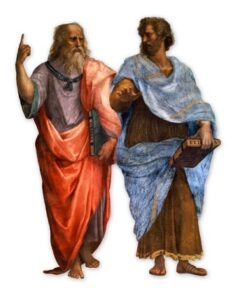What is Political Philosophy? II 001
Parte de:
¿Qué es la Filosofía Política? / II. La solución Clásica
Por Leōnardus Strūthiō
Tabla de contenidos
Leōnardī Strūthiī verba

II. The Classical Solution
When we describe the political philosophy of Plato and of Aristotle as classical political philosophy, we imply that it is the classic form of political philosophy. The classic was once said to be characterized by noble simplicity and quiet grandeur. This suggestion guides us in the right direction. It is an attempt to articulate what was formerly also called the “natural” character of classical thought. “Natural” is here understood in contradistinction to what is merely human, all too human. A human being is said to be natural if he is guided by nature rather than by convention, or by inherited opinion, or by tradition, to say nothing of mere whims. Classical political philosophy is non-traditional, because it belongs to the fertile moment when all political traditions were shaken, and there was not yet in existence a tradition of political philosophy. In all later epochs, the philosophers’ study of political things was mediated by a tradition of political philosophy which acted like a screen between the philosopher and political things, regardless of whether the individual philosopher cherished or rejected that tradition. From this it follows that the classical philosophers see the political things with a freshness and directness which have never been equalled. They look at political things in the perspective of the enlightened citizen or statesman. They see things clearly which the enlightened citizens or statesmen do not see clearly, or do not see at all. But this has no other reason but the fact that they look further afield in the same direction as the enlightened citizens or statesmen. They do not look at political things from the outside, as spectators of political life. They speak the language of the citizens or statesmen: they hardly use a single term which is not familiar to the market place. Hence their political philosophy is comprehensive; it is both political theory and political skill; it is as open minded to the legal and institutional aspects of political life as it is to that which transcends the legal and institutional, it is equally free from the narrowness of the lawyer, the brutality of the technician, the vagaries of the visionary, and the baseness of the opportunist. It reproduces, and raises to its perfection, the magnanimous flexibility of the true statesman, who crushes the insolent and spares the vanquished, It is free from all fanaticism because it knows that evil cannot be eradicated and therefore that one’s expectations from politics must be moderate. The spirit which animates it may be described as serenity or sublime sobriety.
Hispānice

II. La solución Clásica
Cuando describimos la filosofía política de Platón o de Aristóteles como filosofía política clásica, damos a entender que la suya es la forma clásica de la filosofía política. Lo clásico ha sido caracterizado por su noble simplicidad y su sosegada grandeza. Esta apreciación nos encamina en la buena dirección. Es un esbozo de articulación de lo que antiguamente se denominaba el carácter «natural» del pensamiento clásico. Entendiendo «natural» en contraposición a lo meramente humano, demasiado humano. Se dice de un ser humano que es natural si se guía por la naturaleza en lugar de atenerse a las convenciones, la opinión heredada o a la tradición, por no hablar de aquellos que están al albur de sus caprichos. La filosofía política clásica es «atradicional»,1non-traditional porque pertenece a aquel fértil momento cuando todas las tradiciones políticas fueron sacudidas, y aún no existía una tradición de la filosofía política. En todas las épocas posteriores, el estudio acometido por los filósofos en relación a los asuntos políticos estuvo mediatizado por una tradición político-filosófica que actuaba a modo de pantalla entre el filósofo y los asuntos políticos, independientemente de que cada filósofo mantuviese o rechazase dicha tradición. De esto se sigue que los filósofos clásicos contemplen lo político con una frescura y franqueza que jamás ha vuelto a tener parangón. Ellos observan los asuntos políticos desde la misma perspectiva que los ciudadanos ilustrados o el hombre de estado. Ellos observan las cosas con claridad donde los ciudadanos ilustrados o el hombre de estado no logran observar claramente, o no pueden observar nada. Esto no tiene otra causa sino el hecho que los filósofos clásicos observan mucho más lejos en la misma dirección que los otros dos tipos humanos. Estos filósofos no observan los asuntos políticos desde fuera, como si fuesen simples espectadores de la vida política. Hablan el lenguaje de los ciudadanos o de hombres de estado; apenas emplean algún término que resultase extraño a el habla del mercado. Por este motivo su filosofía política es comprehensiva, pues es tanto teoría política como habilidad política. Es una filosofía tan abierta a abordar los aspectos legales e institucionales de la vida política como lo está para asumir aquello que trasciende a lo legal y lo institucional. Es una filosofía tan libre de la estrechez del jurista como de la brutalidad del técnico, de los caprichos del visionario o de la vileza del oportunista. Reproduce y eleva a su perfección, la magnánima flexibilidad del auténtico hombre de estado, que aplasta al insolente y perdona al derrotado. Está libre de todo fanatismo, porque sabe que el mal no puede ser erradicado y, por tanto, nuestras expectativas de la política deben ser modestas. El espíritu que la anima puede expresarse en términos de serenidad y sobriedad sublimes.
ARCĀNA IMPERIĪ ***
